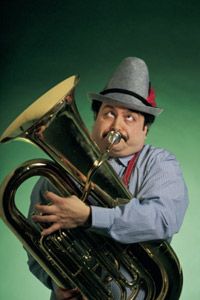Traditional German Music
Musical history in Germany is just as colorful as the country's dress. The Reformation, the religious movement away from the Catholic church that gave birth to Protestantism, was led by Martin Luther, from Germany, and John Calvin, from France. Luther felt music was one of God's greatest gifts and made it a cornerstone of his movement [source: Kitchen]. This environment cultivated generations of musical development and paved the way for German composers such as Johann Sebastian Bach and Wolfgang Amadeus Mozart.
Music is perhaps the area where German culture is most prevalent beyond its own borders. Particularly in America, the influence of German immigrants is inescapable and may be largely responsible for the rise of symphony orchestras, which along with opera, was a popular art form in Germany, in metropolitan areas with large German populations. As early as 1853, Milwaukee hosted a performance of German composer Albert Lörtzing’s opera “Zar und Zimmermann” to an audience of 800. This was at a time when the city was only 30,000 strong [source: Daniels].
Advertisement
From that point onward, German-born conductors were a primary influence in American orchestras, conducting symphonies in Chicago and New York. And German-American banker Otto Kahn financed the Metropolitan Opera during its formative years [source: Daniels].
Volksmusic (not the iPod in your VW Beatle) and Oompah music are two traditional genres that have become synonymous with the Germany. Volksmusic , which originated in the mountainous region of southern Germany, translates to "music of the people" and is played primarily in Bavaria. These folk songs are usually very colloquial and performed on simple instruments such as guitars or harmonicas. Oompah music is a term that encompasses several forms of horn-centric music played in Eastern European countries. Oompah is played by brass bands and gets its name from the thump-thump-thumping of the tuba, one of the most important pieces for any self-respecting Oompah band. In addition to brass, Oompah also uses/incorporates/employs accordions, which produce such a distinct sound that can invoke cravings of sausage and beer. It's difficult to determine the age of each of these genres, but both are still performed and are widely popular today.
German music is an important element for the beirgarten, which originated in Bavaria in the 19th century [source: German Beer Institute]. Before ice blocks made refrigeration at least a little more accessible, biergartens were where beer was stored. And where beer is stored, beer drinkers will congregate. Today, biergartens are operated around the world and are among the most recognizable German traditions.
In the next section, we'll discuss other German traditions -- including Oktoberfest.
